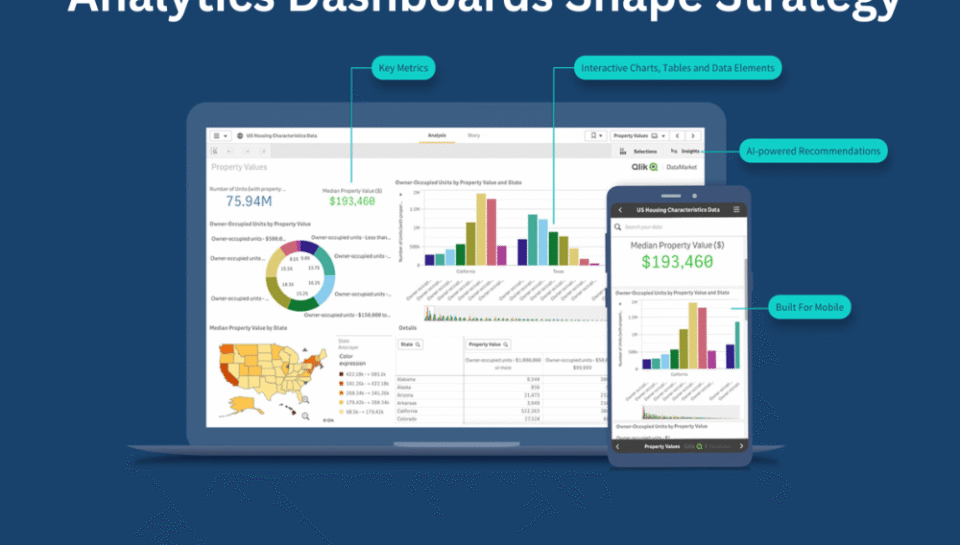
Detail how analytics dashboards shape strategy
Introduction
In today’s data-driven business environment, analytics dashboards have become indispensable tools for strategy formulation. These visual interfaces not only simplify the complexity of data but also allow stakeholders to make well-informed decisions based on real-time insights. Whether you’re steering marketing efforts, improving customer experience, or boosting operational efficiency, the ability to visualize and interpret data rapidly has become a competitive advantage. Dashboards, when used effectively, bridge the gap between raw data and actionable strategy, ensuring businesses remain agile, efficient, and aligned with their objectives.
Understanding the role of dashboards in decision-making
Dashboards serve as the control center for strategic analysis. By consolidating data from multiple sources, they enable decision-makers to view KPIs (Key Performance Indicators), track performance metrics, and forecast trends in real time. This centralized access promotes quicker reaction times and informed strategic shifts, which are vital in fast-moving industries. Instead of relying on intuition or outdated reports, leaders now depend on dashboard visuals to interpret performance and reorient strategies proactively.
Driving strategic alignment through KPIs
One of the greatest strengths of analytics dashboards is their ability to link operational activities with strategic goals. By highlighting KPIs across departments—such as sales conversions, marketing ROI, or customer satisfaction—dashboards ensure that every action aligns with broader organizational priorities. This alignment fosters clarity, accountability, and uniformity in pursuit of business objectives, minimizing the risk of disjointed efforts and maximizing efficiency across functions.
Enabling real-time monitoring and responsiveness
In strategic management, timing can be the differentiator between success and failure. Dashboards provide real-time data feeds, allowing leaders to monitor developments as they happen. This immediate feedback loop supports swift pivots in strategy—whether it’s halting a failing campaign, reallocating budgets, or enhancing service delivery. Real-time visibility also aids crisis management by allowing companies to respond to unforeseen disruptions with agility and precision.
Facilitating data-driven culture and collaboration
The visual and accessible nature of dashboards democratizes data across an organization. No longer confined to data analysts, strategic insights are available to marketing, sales, finance, and operations teams alike. This accessibility nurtures a data-driven culture where every stakeholder can interpret trends, share insights, and contribute to strategic planning. It enhances collaboration by aligning teams under a unified data perspective, encouraging coordinated actions and shared objectives.
Benchmarking and competitive analysis
Strategic dashboards often incorporate external data sources to help organizations benchmark their performance against industry standards or competitors. By analyzing trends in market share, customer sentiment, or digital engagement, businesses can identify areas where they lag and innovate strategically. Dashboards empower organizations to adapt to competitive landscapes, forecast shifts in consumer behavior, and remain proactive rather than reactive.
Optimizing resource allocation and budgeting
Analytics dashboards also play a critical role in financial and operational planning. They reveal where resources are being effectively utilized and where inefficiencies lie. By analyzing metrics such as cost per acquisition, lead-to-conversion ratios, or campaign performance, businesses can reallocate budgets and optimize workflows to ensure maximum return on investment. Strategic resource allocation ensures that every dollar spent supports the organization’s long-term goals.
Enhancing customer insights and personalization
Customer-centric strategies thrive on accurate insights. Dashboards that integrate CRM and behavioral analytics provide a comprehensive view of customer journeys, preferences, and pain points. These insights enable businesses to develop targeted campaigns, improve product offerings, and enhance customer satisfaction. Personalization strategies—when backed by real-time customer data—can drastically increase engagement and retention, directly impacting long-term growth.
Improving forecasting and trend identification
Strategic planning is not just about reacting—it’s about anticipating. Dashboards use historical and predictive analytics to identify trends before they become apparent to competitors. From seasonal purchasing habits to emerging market demands, dashboards enable businesses to prepare for the future. Forecasting modules allow organizations to simulate different scenarios, evaluate risks, and plan for both opportunities and contingencies, reinforcing strategic foresight.
Supporting continuous improvement and accountability
Dashboards instill a mindset of continuous evaluation. By regularly updating data and tracking results, businesses can assess the effectiveness of their strategies and fine-tune them accordingly. They promote accountability by clearly showing who is responsible for what outcomes, encouraging ownership across departments. This transparency supports iterative improvements, ensuring strategies evolve based on performance rather than assumptions.
Conclusion
Analytics dashboards are more than just visual tools—they are strategic enablers that convert raw data into actionable insight. They unify teams, guide resource allocation, illuminate customer behavior, and provide the foresight necessary for sustainable growth. As organizations continue to grapple with complex markets and fast-changing environments, the role of dashboards in shaping, refining, and executing strategy will only become more vital. By embedding dashboard usage into the fabric of decision-making, companies position themselves for smarter operations and greater long-term success.
Hashtags
#AnalyticsDashboard #StrategicPlanning #DataDrivenStrategy #BusinessInsights #RealTimeAnalytics #DataVisualization #KPIMonitoring #MarketingAnalytics #PerformanceTracking #ForecastingTools #CustomerInsights #OperationalExcellence #BusinessDashboards #DashboardMetrics #DataEmpowerment #DashboardStrategy #DecisionMakingTools #DashboardDesign #BusinessGrowth #StrategicExecution #AgileBusiness #PredictiveAnalytics #TeamAlignment #SmartData #ContinuousImprovement





